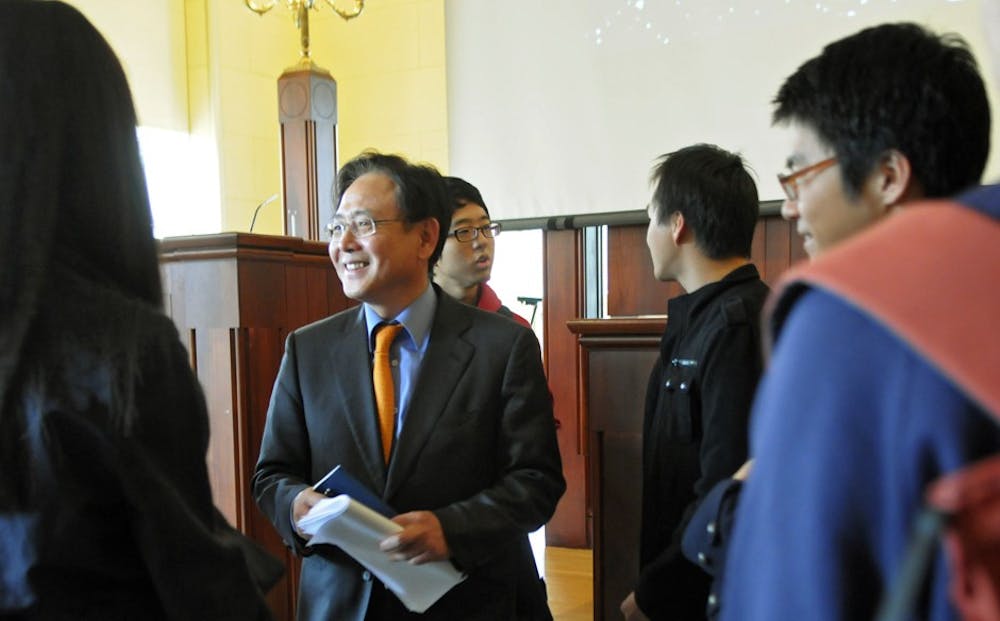
Consul General of the Republic of Korea in New York Young-mok Kim paid a visit to Penn yesterday for an event hosted by the newly endowed James Joo-Jin Kim Program in Korean Studies.
Bolstered by two gifts totaling $7.5 million, the interdisciplinary Korean Studies Program will continue to expand its programming and opportunities.
At an alumni event in Seoul, South Korea, in May, Penn President Amy Gutmann announced James Joo-Jin Kim’s $6 million gift to the program that now bears his name. Kim graduated from Wharton in 1959 and received a master’s degree in economics from Penn in 1961 and a Ph.D. in 1963. An additional $1.5 million donation from an anonymous Penn graduate will establish the Moon Family Post-Doctoral Fellowship in Korean Studies for the program.
The gift will “provide an annual stream of spendable income in support of the program in perpetuity,” School of Arts and Sciences Dean Rebecca Bushnell wrote in an email.
Originally established in 1997 as the Center for Korean Studies, the program is the one of the oldest in North America.
It currently offers a minor for undergraduate students and an exchange program with Seoul National University.
Students are able to major in East Asian Studies with a concentration in Korean, but there is no formal Korean studies major.
Program Director Eugene Park attributed this to a lack of resources and professors and the relative young age of the discipline compared to Chinese and Japanese studies.
With the gift, the program hopes to support more visiting professors from multiple disciplines, lecture series, graduate and post-doctoral fellowships and summer undergraduate research grants, Park said.
“The gift will help push us forward and contribute to awareness and interest of Korean studies,” he said.
Park’s professorship is endowed by the Korea Foundation — an organization promoting Korea’s academic and cultural exchange programs with the world.
When he arrived at Penn two years ago, there were no tenured professors in Korean Studies, Park said.
As a result, he wanted to “articulate a vision” for the discipline at Penn.
In May, Gutmann also signed an agreement with Seoul National University to strengthen the partnership between the two research universities.
Park revived the Penn-in-Seoul program this summer, which allowed 25 students to take courses at SNU and intern in the city.
For the coming summer, Park hopes to approve certain classes that would count for credit at Penn.
College junior Yena Hong, who studied in Seoul through Penn this summer and is continuing her studies there this semester, called the experience “worthy and memorable.” She looks forward to seeing the program grow.
“Because Penn doesn’t have as many classes on Korea as it does on China or Japan, this partnership [with SNU] will serve as an outlet for students interested in Korea, allowing them to further their education using different resources,” she wrote in an email.
“This is an exciting time for anyone interested in Korea to be at Penn,” Park said.
He added that an increasing number of students who are not Korean are showing interest in the discipline.
“When I first taught Korean survey courses, the majority of the student body were heritage learners, but that percentage is decreasing steadily. Korea is becoming of interest to everybody.”
The program will host a conference titled Comparative Perspectives: The Politics of Public Space in Korea on Nov. 11-12.
The Daily Pennsylvanian is an independent, student-run newspaper. Please consider making a donation to support the coverage that shapes the University. Your generosity ensures a future of strong journalism at Penn.
DonatePlease note All comments are eligible for publication in The Daily Pennsylvanian.





